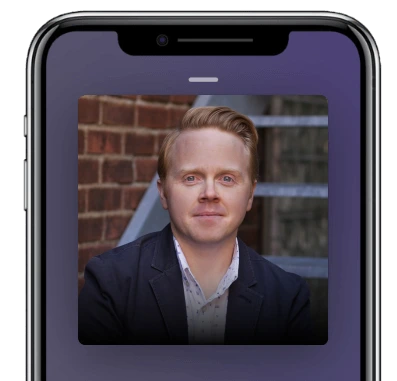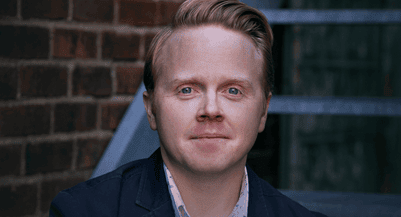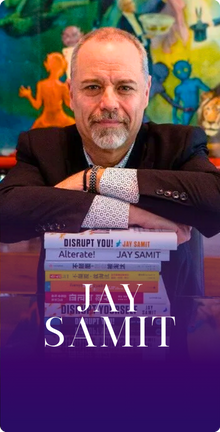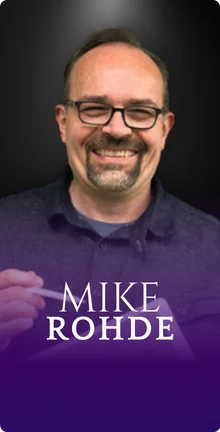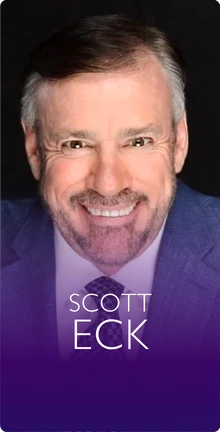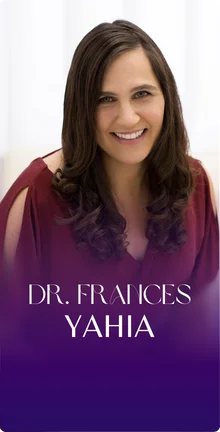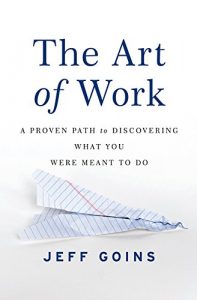
Thank you for joining us today, Jeff.
Hey, Stephan. Good to be here. Thanks for having me.
We have to start with your origin story. I know you said this a million times but for folks who don’t know who you are, how amazing you are, and what you’re doing in the world, you’re doing some amazing stuff. You didn’t just wake up one day and just suddenly start authoring best-selling books and changing the world, you somehow ended up in that place. Can you share with us a little story of how that all came to pass?
Sure. I’m a writer who helps other writers and creatives succeed, that’s probably the most succinct way I can say it. What I think looks like is I’m only trying to figure out how things work for me and then sharing what I learn with other people. My story is that my whole life, I was a creative. I was an artist when I was a kid. I won the school spelling bee when I was in sixth grade. That was the only thing I’d ever beaten anybody at, so I was like the word guy now and I got really into writing.
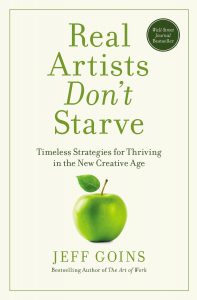
My dad taught me how to play guitar. I took these sad poems about girls that wouldn’t go out with me and I turned them into sad songs about girls that wouldn’t go out with me. I acted in plays. I did all these different things and never really thought that I could be an artist for a living, that I could never be a writer or somebody who made things, shared them with the world, and actually got paid to do that. I graduated from college and I ended up touring the country with a band playing music.
To keep the costs of that experience low when we would go play shows in different towns, we would stay with families, we’d sleep on their couches or whatever we’d stay in anything from mansions to trailers. Pretty much everywhere that we went, people would say, “It’s a good thing that you’re doing this now because when you get older, you’re not going to be able to do this. You’re not going to be able to play music for a living.” I thought, “Yeah, you’re right. It’s a good thing that I’m doing this young because later on, I have to get a real job.” I agreed with them that you couldn’t make a living as an artist, as a creative professional.
I went and got a job after that year with a nonprofit organization and became a marketing director. I don’t know anything about marketing, I just knew how to write. I was hired as a copywriter. I started reading Seth Godin, which was a pretty good crash course in marketing. Eventually, I became the marketing director of this non-profit organization. We worked with individuals and organizations and did relief and development work in the developing world.
I did that for seven years, telling other people’s stories, raising money for the organization, spreading the mission of what we’re about, and along the way realized I had a story that I wanted to tell about myself. I wanted to start writing again and get back into that. I really struggled with this. I started writing, I started a blog but I didn’t think you could make any money doing that. I didn’t think you could be a full-time writer. It was just a hobby.
It was around this time that I had a conversation with a friend where he asked me what my dream was and I said that I didn’t know. I said, “Yeah, I don’t think I have one of those.” He said, “Really? Because I would have guessed that your dream was to be a writer.” As soon as he said that, I felt that hit me and I said, “Yeah, I’d like to do that someday but that’ll never happen.” He just looked at me and he said, “Jeff, you don’t have to want to be a writer. You are a writer. You just need to write, right?” I was like, “All right, fine, fine, fine.”
That word from a friend unlocked something in me, that was already there, but I needed somebody to remind me of that. After that moment, I started writing every day on a blog. I got up at 5 AM, just started writing a 500-word article and publishing it every single morning. I did this for a year. When people asked me what I did, immediately after that conversation I said, “I’m a writer.” Guess what happens when you go around calling yourself a writer? The next question that people tend to ask you is, “Well, what do you write? What are you writing?”
For me, this was a way of forcing my hand into the vocation, into the work that I knew that I needed to be doing but was afraid to do. I don’t think of this as necessarily faking it until you make it as much as believing it until you become it, so I was constantly putting myself out there and then forcing myself to own this title that I was claiming.
About a year, I got a publishing deal. And within two years, I replaced my income, my wife’s income who’s getting ready to have our first child, and then we ended up tripling our household income in about six months. It became possible for her to quit her job and become a full-time mom which was something that she wanted to do. Then I ended up quitting my job.
In a year, this was 2012, I published two books, started a business, my wife quit her job, I quit my job, and we had a baby. I’ve been doing this kind of work ever since, writing books, teaching online courses, and programs for writers and creatives.
It's natural to not be as good at work as you'd like yourself to be in the beginning. It only means you have excellent taste in your goals, and your talent hasn't caught up yet. Share on XAnd also doing seminars, live seminars, or workshops? Have you been doing that too?
Yeah, in-person workshops, mastermind groups, a variety of programs, events, and things.
You said something that really resonated with me, it’s not fake it until you make, it’s more like acting as if or doing the thing that you’re called to do even though you may not be good at it at the beginning because it will just happen for you. I think that’s an important distinction, acting as if versus faking it until you make it.
When you fake it until you make it, you give energy to this concept that you aren’t enough or that you are a pretender, an impostor. You use the term impostor syndrome. I’m curious, did you ever consider yourself an imposter or having potentially impostor syndrome?
Always. I always felt like a fake. I felt not good enough. I think that’s different from feeling like a fake, maybe. I agree that faking it until you make it is reinforcing this idea that I don’t deserve to be here. I grew up with a lot of shame. I was very overweight as a kid. I’ve struggled with my weight most of my life and got really teased early on by kids, peers, and friends. That was a hard thing to shake, it’s a hard thing to shake even today.
I come on to any scene with the assumption that I don’t deserve to be here, that I’m not good enough, and I’ve got to fight that back. I didn’t need any more of that energy as you said. Writing was something that I’d always done, it was always something that came naturally to me. I began to wonder, what if I am already this thing that I’d like to be? Now it’s just a question of really growing into it and fully becoming it.
I do think that there’s a difference between truly feeling like a fake and simply feeling not good enough right now. I like the way Ira Glass talks about this in what some have called the taste/talent gap. I believe it was Ryan Holiday who codified it with that title—taste/talent gap which is to say I’m not good enough yet, which Ira Glass inverts and says, “What that means is that you’ve got a really good taste.”
When you start out in any profession and the work that you do is not as good as you would like, that means you just have really good taste and your talent hasn’t yet caught up to your taste. That’s normal and natural. That’s different than being a fake. That just means that it’s not good enough for you yet. Great, you have a goal, you have something to grow into but it doesn’t mean you don’t deserve a seat at the table.
Do you think this complements or runs counter to the concept of having a unique ability that you would use, let’s say some assessment to determine what that is like? I’m going through Dan Sullivan’s Strategic Coach Program right now and learning about what he calls unique ability. There’s a whole process that you go through to identify what that unique ability is.
Then the idea then is to focus on that unique ability, spend 80-plus percent of your time in your unique ability, and just drop everything else, delegate, delete, defer, anything else that’s not in your unique ability.
I think the ancients, the Greeks called that genius. The transcendentalist, people like Emerson and Thoreau, resurrected this idea that there is a hidden force inside of you, your genius, your unique ability. It is the thing that only you do the way that you do it. I do agree with that insofar as I understand it. I do think that the zone of genius is ever-expanding and that we, in many ways, are a mystery to ourselves.
Anytime that we go, this is the thing that I do and this is the thing that I’m best at, that’s the voice of ego. Ego is always talking about the past. It’s always talking about the things that you’ve done. The ego is often afraid of the future and it’s trying to bank on the achievements of the past. It’s not the voice of possibility. Genius, in many ways, is always about the possibility and what could be.
If you think about your dreams and goals, the things that are often most exciting are not the things that you’ve done or even the things that you think you’re capable of doing right now, but it’s the question what could I do if I could do anything? That’s always what seems to excite us and I think there’s a reason for that.

I do like the idea that our whole life is really an effort to discover what our life’s work is, what our calling is. In some ways, it’s a mystery until the very end when we look back, we see how all the dots are connected, and we go, “Oh, that’s the picture that I was painting. That’s the mosaic that I was creating with my life.”
If you think about some of the great master artists, inventors, entrepreneurs, great creators throughout history, one creation led to the next, led to the next, led to the next. A great example of this is Michelangelo was a sculptor and he was like, “I’m going to be the world’s best sculptor.” Then he got into a painting contest with Leonardo da Vinci. Against his will, he was goaded into it, he was a prideful man, and he’s like, “I have to defend my honor.” Leonardo da Vinci said, “Painting is better than sculpture.”
Michelangelo was like, “How dare you? Sculpting is the finer art.” They got into this painting war and Leonardo beats him. They had the public votes, Leonardo beats him, and he gets this commission. They’re gunning for a commission. But Michelangelo’s mural, he does this public mural in Florence, was good. Now he’s known as a painter. This thing that he didn’t want to do and be known as and next thing he knows, the Pope calls on him and says, “I need you to paint a ceiling for me,” which becomes the Sistine Chapel.
Imagine what would have happened if Michelangelo simply said, “No, no, no, I don’t paint.” We wouldn’t have this thing called the Sistine Chapel. I think we have to be very careful that in these assessments and searches for significance that help guide us, they clarify the inner voice, the calling inside of us that says, “This is who I am, this is what I’m here to do.” My guess is if you took that assessment, you’re like, “Meh, this is not me,” it wouldn’t hold the same weight as you take the assessment and you go, “Yeah, this makes a lot of sense.” There is some inner resonance that happens.
I do believe that you are always the one who’s saying what’s true for you. You’re always the one who gets to decide this is who I am. I think so long as we don’t ever try to camp out on a single identity or achievement, we keep growing, evolving, changing, becoming who we’re supposed to be. To me, that seems to be what it’s all about.
All great statements and ideas. I’m curious if there are assessments that have been particularly impactful for you. For example, StrengthsFinder for me was very valuable. Myers-Briggs, not so much. I did get a lot of value also from Sally Hogshead’s Fascination Assessment.
Those are just some examples of some assessments. I’ve done a bunch and there’s a bunch on my to-do list to do like PRINT and Kolbe I’m going to do. I’ve heard really good things about the Kolbe assessment. I’m just curious, what are your favorites?
There was a time where I was addicted to these things. I was searching for someone or something to tell me who I was so I could just be that. I did that to a fault to the point that I remember, one of the ways that I grew my influence was by asking influencers what I should do, then go doing that, and they would go, “Look at that guy doing that thing,” and they would promote it, praise it, or whatever.
I remember in 2015, I just had this best-selling book come out. I was at the top of my game, making the most money, doing the most things, everything was going great, and I didn’t know what to do next. I had gotten to the point simply by outsourcing inspiration, and asking other people what I should do. I asked this influencer, this friend of mine, this mentor-type best-selling author, a very successful entrepreneur, leading this huge online community. I said, “Hey, what should my next book be about? What do you think? I’ve done this, now what should I do next?”
This was how I had endeared myself to influential people, playing the role of the apprentice, the student, always learning. He sent me the response, the email was one sentence, “I have no idea!” That was it. I have no idea. I was taken aback and I was a little bit offended by the brashness of it. I thought, “Yeah, of course. How could you? How would you know? It’s me, it’s my life. You have no idea, you’re living your life. Why have I been doing this for long?”
It forced me to figure out the direction of my life for me. That said, I still find assessments valuable tools, but I realized that they cannot tell you who you are. They are at best shovels and picks in the archaeological dig of your life where you’re uncovering different pieces and aspects of yourself. That said, I like the Enneagram a lot. That’s a very popular tool, especially here in the Nashville crowd. I don’t know if you’re familiar with that. It’s based on these nine different numbers.
Our entire existence is an effort to discover what our life's work is. In some ways, it's a mystery until the very end. When we look back, we see how all the dots are connected. Share on XBut the people who are really into that, the smart friends of mine say, “You’re not a number. All that means is that you are leading from that particular space. It tells you what your strengths are but also some other areas of your life that you can cultivate.” I do like the idea that you should focus on your unique ability, but I also think every zone of genius has its shadows, faults, and quirks.
I don’t think you should focus on your weaknesses, but I do think part of the goal of life is to become a whole person. It doesn’t mean perfect, it doesn’t mean boring, but it means whole. If there’s some broken area of my life that in some ways creates strength in another area, shame was a big one for me.
Shame is a great tool if you put it to use for you and you go I’m never going to be embarrassed again. I’m going to throw myself into the world of achievement and I’m never going to feel good about where I am, which means I’m always going to be striving. I’m probably never going to be broke because I’m so terrified of being in a place of need and feeling the weight of that shame again.
Shame helps me do some things that some might look at and go, “Oh, that’s a success,” but there was a lot of anxiety that came with that success. The past few years, I’ve been looking at that and going how do I make this whole? How do I heal what’s broken without necessarily letting go of the good things that have come as a result of this thing? Myers-Briggs was good. Enneagram is probably the thing that I pay a lot of attention to these days.
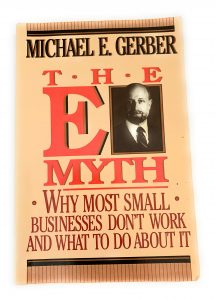
There’s a very simple easy test for working for colleagues and co-workers that I like a lot by a guy named Les McKeown called The Synergist test. Super simple, super easy, but very useful. He talks about four different types of workers. There’s the visionary, the processor, and the operator, similar to the E Myth, entrepreneur, technician, manager, but basically, he says these three types of co-workers cannot work well together.
The visionary is going to be blowing things up, the operator is just going to want to get something done, and the processor’s going to want to know what the process and the plan is. There’s a fourth type of person called the synergist, an integrator type, who has to bring these three other three types together. That’s a helpful test and a really great book about how visionary entrepreneurs are usually terrible people to work with, unless they become self-aware, get the right people around them, and figure out how to work with those people, usually by hiring some synergist. Anybody who starts things should read that book, I think.
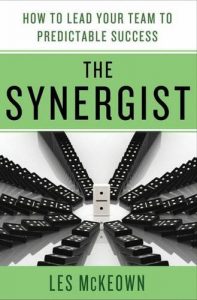
That reminds me of Tony Robbins teaches this thing of you’re one of three types of business people. You’re either the artist, the entrepreneur, or the manager/leader. If you are the artist, you desperately need to have the entrepreneur and the manager/leader recruited and part of your team or you’re going to end up potentially going out of business. Similarly, the manager/leader without the entrepreneur, without the artist is lost. You need all three and I thought that was pretty insightful.
The term that McKeown uses is visionary arsonist, which I think is an apt moniker. The idea here is you will always burn the current thing down for the new thing. That’s actually a terrible way to run a business. The point when things start working in a business is the point at which the artist, the visionary person is completely and utterly bored and they’re not feeling inspired. You have to have a manager type that goes, “I’m going to run this and you go launch your next thing, but you don’t have to burn this down.”
The visionary arsonist idea reminds me of Jay Samit who I’ve interviewed on the show. He’s the author of the book Disrupt You! You have to find the opportunities to disrupt yourself before your competitors do that to you. It’s a cool concept.
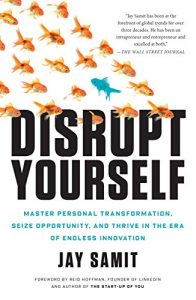
Smart. Burn it down.
I’m curious about this idea of making yourself whole and the broken areas in your life, addressing those areas. That idea triggered for me this concept that I learned in Kabbalah. If you could imagine a prism, on one end of the prism where the light is coming out, you’ve got all the colors. The colors of indigo, red, violet, and what-have-you. If you could imagine that each area of your life is one of those colors, you got your intimate relationship with your spouse or partner, you have your career, you have your physical fitness and all this stuff.
A lot of folks are chasing after the different colors but in reality, those colors are all part of the white light. The light of the Creator, the light is just everything. The universe or your higher power, however, you want to call it unless you’re atheistic and then it’s just like all random, whatever.
If you think about chasing after that white light that’s going into the prism instead of chasing after all the different colors, because what happens is you chase after one color, let’s say you go after your career and your relationship falls to pieces or you focus too much on your relationship and you let your career fall apart, this has been a pivotal concept for me. It’s really helped me to keep the bigger picture in mind and to “juggle” all these areas of my life in a much more holistic fashion. What are your thoughts on that?
I love that. Speaking of light, light always casts a shadow. Another way of thinking of that is we never really see a person’s work, we see the success, we see the outcome, and we go, “Look at that couple walking in the public, holding hands at the park or something with their kids. That’s a happy marriage. That’s a happy family. I would like to have that.” When, in reality, you have no idea what’s happening between all three of those people. It could be the best or the worst thing and you have no idea what it took to get to that point. You are essentially seeing a shadow.
We see this in people’s lives all the time. Oh, you drive a Tesla. I would like a Tesla. That’s a shadow. Wanting a Tesla, in and of itself, doesn’t get you a Tesla. Doing the work, research, or whatever was required in acquiring a Tesla is how you get the Tesla. It’s a shadow and a lot of people do chase after shadows instead of after the light, whatever it is because, in some ways, a shadow is easier to see than light. Light is everywhere. It’s even harder to identify the source of the light.
It’s easy to chase after a shadow until you realize it’s not real. It’s not a real thing because a shadow is not a thing, it’s the shadow of the real thing. I do think that all of our ambitions in life are really shadows of the one true desire which is to be whole, which is to be connected to God, consciousness, life itself, and in some ways, that requires a detachment from everything else that’s not a true desire which, in Eastern mysticism, we would call attachments, illusions, the idea that I want this thing and it’s going to make me happy.
But after enough life, you want enough things and realize I’m not necessarily the best predictor of what’s going to make me happy. I just think sometimes, we’re chasing after shadows and we have to acknowledge that when we get the thing that we think we want and it doesn’t satisfy us, there may be something deeper we’re longing for. It’s okay if you haven’t named that.
There’s a really profound discussion here. This idea of the shadow and seeing somebody in their nice new Tesla, getting jealous of them, maybe envious reminds me of this concept of evil eye. It’s something that I used to think of as superstitious, but now I can see how it’s almost like saying a prayer hoping for something negative to happen to the person instead of something positive.
I could actually see how that might make sense. It’s not just a superstition like a black cat running in front of your path or something. No. Somebody could say a negative prayer about you just like they could say a positive prayer about you or for you. Both could affect you. This idea that somebody sees that little thing about you or about your life, your lifestyle and says, “I want that. That’s not fair that I don’t have that and they have,” that could just be as negative energy that’s being shot your way.

In that regard, I tend not to showcase my amazing life on social media and everything. I feel very blessed and I had lots of gifts in my life from the Creator. I don’t want to showcase that on social media. You don’t see lots of pictures of like my newborn son who’s now three months old as we’re recording this on my social channels. I just posted one photo and that was several weeks after he was born. That’s been it. It’s like crickets. Lots of cool stuff about my podcast episodes of things, but I just don’t get into the “keeping up with the Joneses” thing on social media, showing off a private jet, not that I have one. That stuff is not my game, not my shtick. I’m curious what your thoughts are on that.
I do think that 100 years from now, what we understand about the quantum field and things that feel very woo-woo even now, we’re going to look back and go, “Oh, look at how silly and superstitious they were and how much they didn’t even understand how everything was connected.” We think even now, we’re pretty materialistic in the sense that material is real and then there’s everything else. That’s like spiritual or non-physical and somehow not real, when in reality, most of the physical universe is invisible, is energy, and dark matter.
If you send your kid to school wearing the new, cool Air Jordans or something, it made other kids jealous, they tripped him, pushed him down, and made fun of him, there would be no question that these kids who were jealous or whatever were inflicting physical harm on your child. That’s very clear. But when somebody wishes ill on somebody or even feels jealousy toward them, which is not a positive emotion, we just have no idea what’s happening energetically.
I don’t know and I’m not going to pretend to know, but it could be the equivalent of tripping a kid as they walk down the aisle. You don’t know. I think that’s very interesting and laudable not showcasing that for no other reason. I don’t want to trigger that in other people and I don’t want to attract any of that. I agree with that maybe for slightly different reasons because I think me, sharing my awesome life publicly, in a way, sickens me. It does something to me that I don’t like at a soul base state level.
One of the things that it does says, “Look at the shadow. This is me. I’m the shadow. Look at my shadow, don’t you like my silhouette? Isn’t it great?” I can start to believe that I’m the shadow. Thomas Merton talks about this. He says, “We all have two selves. We have the true self and the illusory self,” which we might think of as the soul, your consciousness, and your ego.
The problem with having a shadow of self and illusory self is that if you look at it long enough, you start to believe it’s the real thing. If I show you all the highlights of my life, all my achievements, all my shadows, the person that I probably deceive the most is myself. Now, I’m living my life differently if I have to report to you my audience, my friend, my peer on social media, or whatever, once a day or once a week, I’ve got to show you the highlights, it affects the way I live my life.
You’re living a false pretense.
Instead of thinking that everything I do matters, now I’m thinking about the only things that people see me do matter. I do believe that comparison is a losing game no matter what. At the end of the day, my job is to run my own race, do my own thing, live my own life. You’ve got your own race to run.
'What you're aware of, you're in control of. What you are unaware of is in control of you.' - Anthony de Mello Share on XI remember a friend of mine, who is a pretty famous public speaker, wrote this book and was scrutinized, criticized, and outcasted by a particular group of people. It seemed to be the end of his career and it actually opened up another door for a whole new set of possibilities. But for a couple of years, things were looking pretty bleak there. I asked him, “Do you regret doing that? Was that hard when everybody kicked you out of this one group and said you didn’t belong anymore?” because it was over for him. It just so happened that it led to a much bigger broader way of being.
He said, “No, it was hard but I never regretted doing that because when they kicked me out and said I didn’t belong anymore, they misunderstand what I was doing all along. They said I was playing bad tennis and I’m over here playing golf. I’m playing baseball, I’m playing a whole different game.” This is what we do. We go look at this person with the Tesla, their life must be really good. I’d love to have their life. It’s like looking at somebody playing tennis and trying to figure out they’re the best tennis player I’ve ever seen. I’m going to apply this over to this game of golf that I’m playing. It just doesn’t work.
There are probably some principles that you can glean, but we got to be very careful with all this what’s your morning routine or the five things that billionaires do before breakfast. Okay, fine, but we have to consider things like survivorship bias. Just because you ate an apple a day every day and you survived cancer doesn’t mean the apple had anything to do with you surviving cancer. Just because you get up before five o’clock in the morning every day doesn’t mean that’s why you’re a billionaire. It could, but we don’t know.
I think we could be students and pay attention to other people’s lives and work while understanding that there is a translation process where I translate what works for you to what works for me. As somebody who speaks another language, one of the things we learned when I was studying Spanish in college, living in Spain, was all translation is interpretation. All translation is interpretation. There are words in Spanish that don’t translate to English. There are words in Arabic that don’t translate to Spanish. There are entire concepts in Chinese that we don’t even have frameworks for in Western culture.
We just have to understand that what worked for you in your particular context. Even in LA versus Nashville, different cultures, different norms, different ideas, different ways of being. Again, I could go, “That’s very interesting. I love paying attention to other people’s stories, I love reading biographies,” but understand you’re looking at somebody’s shadow and that what worked for you will not necessarily work for me because you’ve got your race and I’ve got mine.
Very wise words. One thing I do when I’m looking at what somebody is up to, looking at the shadows of the Teslas and all that stuff, I’m reminding myself that there’s a bigger picture here, that there is that behind the scenes, and there’s everything else that’s connected to that. I don’t want that person’s Tesla, I don’t want that person’s private jet or whatever because I don’t want everything that goes with it. I don’t want to just swap lives with this person.
That’s what people tend to do is they tend to just compartmentalize and say I want that one piece of their life and that one piece is going to be awesome if I have it. But what about the fact that they battled some terrible disease that almost killed them? You don’t want to switch places with them, but you got to remember that you don’t want to switch places with them and not just focus on that one thing that you want that they have.
It’s the whole package. You don’t get one thing without everything else.
I’m curious if we could circle back to you had mentioned briefly that you struggled with your weight in your younger years, you were bullied, and really badly treated. How has that impacted who you are today, how you show up in the world, and what you write?

It’s given me empathy for sure. It helped me understand that you really are the sum of your conscious thoughts, this idea that we become what we think about. That’s Earl Nightingale’s The Strangest Secret. Napoleon Hill says, “Thoughts are things. As a man thinketh, so is he.” There’s all this wisdom literature and ideas about what we think about ourselves really does affect our reality.
Here I am as a shy, overweight teenager who’s getting bullied quite a bit, can’t get a girlfriend, came to puberty late, had long hair, is the 90s, into grunge music wearing flannels, fat and often mistaken for a girl because I haven’t really matured into the body of a man. I’m chubby, and I got long hair, it’s really hard to tell, and affected my confidence.
What’s really funny is junior year of high school and a number of things happen. One, the most popular kid in my class and arguably one of the most popular kids in our small school in rural Northern, Illinois, dies. He collapses on the gym floor and he dies very quickly, suddenly, and tragically. Heart failure, of all things. It totally rocks the school, none of us have ever known a kid to die, especially our age. For me, it wakes me up.
Here’s this untouchable kid whose parents are wealthy and he’s very popular. He has it all and I have none of that. I’m not coming from money, not popular, not cool, girls don’t like me, things aren’t going well for me, and he’s gone. Something about it, it’s this ecclesiastical moment where I realized this is all meaningless and all that matters is what’s here right now. I better make something of this.
I start running. I’m this very shy, overweight kid, who doesn’t really have any friends, and I start becoming very social, inviting these groups of people out to bowling, we all go bowling and hang out. I become the leader of this social group for my junior and senior years of high school. It completely catalyzes this change in my life. I get into pretty good shape. I lost a bunch of weight. I get a girlfriend so I’ve now achieved the thing that I set out to do.
What’s funny is that for years, I still think of myself as that chubby outcast kid. I remember a series of moments that happened in my senior year. One was I remember talking to my girlfriend at the time and thinking that I was overweight. She’s like, “You’re not overweight.” I remember looking back at our pictures. I’m a beanpole with 140 pounds or something and now I’m a skinny kid.

Then the other thing that happened was one Friday afternoon, I got a call from some person I don’t know who’s a classmate. They go, “What are we going to do tonight?” I said, “How do I know?” They’re like, “You’re the guy.” I’m like, “I’m the guy? I’m not the guy.” They’re like, “You’re the guy who decides what we’re going to do.” It taught me something about leadership and going first. That leading is really just being brave enough to say, “Okay, let’s go.” It’s not knowing the answers or even knowing what you’re supposed to do. It’s just being willing to say, “Let’s go that way.”
I was at a conference not too long ago and a group of people went out to a bar afterward. We all walked into the bar and didn’t know what to do. We just froze for some reason. We just stood there and talked. Nobody would order a drink, nobody would do anything. My one friend was like, “Forget you guys,” and he just walked away and started playing darts by himself. A couple of people went over there and I went over there and said, “Hey, is everything all right?” He goes, “Yeah, everything’s all right, but I’m not going to do this thing anymore. We just show up and don’t know what to do. I’m just going to go do whatever it is I want to do.”
That’s leadership. It’s just going, “Let’s go, let’s go.” I find that I keep having to learn that lesson over and over again that if I just get over myself, see an opportunity, and say hey, let’s do something about this, people follow. How that has translated in the work that I do today, it’s as simple as me feeling like not good enough to be a writer, not good enough to share my work with the world, and then just doing it. Not only doing it but encouraging other people to do it.
I find it, especially in the creative work that I do, working with writers, artists, creative entrepreneurs, people who make things and want to share them with the world, the number one question is a question of worthiness. Do I deserve to be here? Am I good enough? Can I share this thing with the world, and people care about it? So shame, because I still hear. It’s interesting. It’s funny because it’s a trigger for me. I gained weight, lost weight, done all of that, and just come to the point where I’m unhealthy and happy with who I am and it’s going to fluctuate.
But right now, I’m a few more pounds than I would like to be and I can feel it. It’s very easy for me to still hear those voices of shame. The bullies are gone, they’ve moved on, but I can still hear their voices. I can listen to them and even think it’s my voice. It just requires a little bit of mindfulness, just a little bit of awareness to go, “I don’t have to listen to that. I don’t have to pay attention to that.”
I think it gives me great empathy for people who struggle with questions of feeling not good enough because I totally get that. It has also taught me that you can do great things while still feeling incomplete, while still feeling like you’re working through something. Why would anybody like this? Who even cares? Are you good enough to do that? Okay, fine. These are voices that I take along with me on the journey towards greatness, whatever that might look like.
Would you say that you don’t even need to address or solve this problem of feeling worthy? You can just get on with your life and do it anyways, act as if? Or is it really best to address that worthiness issue, get past that, feel like you deserve to have a blessed and abundant life, and then just the floodgates are opened?
If I may have my cake and eat it too, I would say both. I do think there are people who go to seminar after seminar, and Tony Robbins their eyes out and they’re trying to fix this problem. They’re trying to fix the whole problem, which is when I feel worthy, then I will do acts. Now that very statement is a statement of shame and unworthiness because what they’re saying is I’m not good enough. It’s a very meta thing. I’m not good enough to go get on with my work because I’m still dealing with this question of shame.
I would say the way in which we deal with any core issue in our life is to get on with it but not repress it, not push it away, not ignore it, but understand it as a presence in my life that I continue to work through and address. If you study anything about trauma—all shame is connected to some even mild trauma—that stuff stays with you. It’s not a demon that necessarily gets exorcised overnight, and in some cases, trauma lives in your body at a cellular level.
I do like what Anthony de Mello, an old priest and psychotherapist from the 70s, great teacher who says about this thing. He says, “What you’re aware of, you’re in control of. What you are unaware of is in control of you.” If you’ve got deep shame issues and you’re refusing to look at those, that’s going to drive you in a very unhealthy and unsustainable way. I think the work is to constantly be aware of why do I feel this way? Why do I feel unworthy? Where does that come from? And how do I get on with it? How do I keep moving?
Awareness and believing in your capacity to accomplish things is more than half the battle. Share on XI’m a fan of retreats, seminars, go off on a mountain top, and go into your prayer closet. Do that work and keep doing the work that you’re here to do. It seems to me that it happens in waves, in fluctuations. But I would never tell somebody go get worthy and then you could share your work with the world because there’s something really powerful about, say Brené Brown who’s talking about shame while experiencing it, not dwelling in it, and not just trying to exercise it in a weekend but going, “Hey, this is part of the human condition and a big part of our culture, so let’s be aware of it and work through it together.”
I do think honestly, the awareness is the work. If you continue to be aware of something, even something like I feel chubby right now and that’s uncomfortable, just being aware of that, not sucking it in, not pretending it’s not there, but just going, “This is uncomfortable for me. I guess I should do something about that.” That’s it. It’s just awareness.
Awareness is more than half the battle for sure. Have you heard of TRE, trauma releasing exercises?
I have. I’ve not done anything like that but I’ve heard about some of that. It’s very fascinating.
I actually just had Dr. David Berceli on this show talking about TRE. He’s the founder of TRE.
It’s very interesting.
It is fascinating to think that you can release trauma that’s in your body that you may not even have any memory of anymore. He was talking about soldiers, veterans who had memory loss. They didn’t even recall the trauma but it was in their body and it got released by doing this exercise of shaking as if you are experiencing the after-effect of trauma just like an animal gets hit by a car and then it tries to shake it off. You do this exercise and it can shed that trauma. It’s amazing.
That’s amazing. It is amazing. Yeah, there’s a lot of hope. There are a lot of amazing things that are happening today for sure.
Now let’s get back to writing and to this gift of conveying a powerful message that you have and so many of us also have the power of storytelling is within many of us, if not all of us. The old adage that facts tell, stories sell, it’s important to convey any message or influence around your product, service, or anything really.
One thing that you had mentioned is that you started writing every day and posting every day. That reminds me of Seth Godin who I also interviewed. He talked about how he would blog every single day without fail. What was it about? Was that some cathartic release? Was it just the habit? Was it that you knew that you were revealing light out there in the world, you’re doing that every day, and that helped build up your worthiness? What was it about that thing of putting “pen to paper” every single day that was the magic for you?
It was the act of doing. It was the act of calling my bluff. I did it for myself, I didn’t do it for anyone. I didn’t do it initially to build an audience. I did it because I had said for so long that I wanted to do it and I didn’t do it. Once I started calling myself a writer, I felt forced to do it. I think looking back on that, I was trying to keep a promise to myself.
I do think that you have to keep the promises to yourself before you can ever hope of keeping a promise to another person. That is true integrity. Integrity means wholeness. To be integrated is to be whole. If you become disintegrated, if you lose your integrity, disintegrated, you’re falling apart. For me, it was just about keeping a promise to myself and developing a habit. I loved it. It was fun.
The only metric early on was can I show up and do this? In fact, who knows what else can happen? But I’m tired of talking about it, I’m tired of wishing about it, I’m tired complaining about not doing it. What if I just tried to do it? Maybe that would be enough. It became fun. Eventually, people started paying attention and all this other stuff started happening. But early on, it was practice. I agree with Seth, he says, “Write like you talk,” which is often and in public. Practice in public. It is the best way to get better faster.
That’s great. Also, there’s this expression that practice makes perfect, but then I learned from Tony Robbins—because I took a lot of his seminars; I am a seminar junkie—practice makes permanent. If you have some quirk about your writing, your speaking, or whatever it is, it doesn’t mean it’s going to go away just because you’re continually hammering at the thing day after day. It may actually make it more embedded into your practice, into your art. What are your thoughts on that?
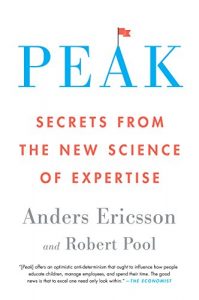
I think the whole study of deliberate practices is a really important one. If you’ve never read the book Peak, I highly recommend it. What is it saying is practice doesn’t make perfect, perfect practice makes perfect. It’s true that you can practice things the wrong way and now, it’s cemented in your brain. That’s why deliberate practice, peak performance requires a coach, some sort of teacher.
You want to be doing your work, at some point, you want to be sharing it, and then getting feedback from qualified leaders, coaches, professionals, if you want to be great at it. There are plenty of things that I don’t care to be great at. I love cooking, I’m pretty good at it. I don’t need Emeril Lagasse to teach me and tell me what I’m doing wrong. I don’t care. It’s not that big of a deal to me. But if you want to be great at it, you need a teacher, you need a guide.
Lots of people including, Tony, poopoo the term guru. But I love the original meaning in etymology of that word guru which apparently are two Hindi words which mean no darkness. Guru, no darkness. The job of a guru is not to tell you what the way is but to tell you all the false paths, to reveal the ways in which you’re doing it wrong.
I like the idea that nobody can tell you what your art is, nobody can tell you what your calling is, at best, they can help you figure out it’s not this, it’s not this, it’s not this, oh, maybe it’s this. What’s left, again, is this mystical idea. What’s left is the one true way which cannot be named, and that’s your path. Even in terms of vocation, the thing that you’re here to do is this mysterious flow that you find yourself in.
There are lots of people who are practicing writing and then writing terrible book, after a terrible book, after a terrible book. You can practice writing badly and now you’re really good at writing badly. Do think having a teacher, a guide, a guru, somebody who can reveal all the ways in which you’re doing it wrong is really helpful. It’s actually very uncommon, very rare these days to have a true teacher.
You think back to the Renaissance, a time of true mastery and I think that’s something that we have a dearth of today in our society, true excellence and craftsmanship. We live in this disposable society where everything you can throw away pretty easily.
Even planned obsolescence, it’s crazy.
Yes, planned obsolescence. Let’s throw away these crappy headphones when they break or whatever. Let’s throw away the IKEA couch when it naturally falls apart five years from now, and that’s fine.
Or the iPhone is two years old. Oh, my goodness, we need to get a new one.
I only spent $1000 on this two years ago, it’s a piece of junk now. Instead of creating and consuming things that last your lifetime. I’m going to buy a coat and it’s going to fit me forever and I’m going to wear it for the next 25 years, it’s not part of our culture. I think that we live in a society where everybody wants to be a master but nobody’s willing to be an apprentice.
Apprenticeship was a 10-year process and 7 of those years is just doing whatever the master said to do. You’re just helping him shine. You’re helping the master artist or artisan do their work better. In humbling yourself and doing that, you begin to learn a lot about the art form. I think that it’s not enough to practice. If I want to be great at what you do, I’ve got to watch you work. I’ve got to see you make the choices that you make and pay attention to it. There are some societies that still do this but most do not. I think that’s a shame.
One thing I would do is I’d go to all these different seminars, Tony Robbins was one of them, and I was Platinum Partner with him so I would do all these extra exotic trips to India, Cabo, Fiji, and all that. It was great. It was definitely life-changing and how I met my wife, too, was through one of those events.
So much of what you learn, you don’t implement. What people would do is they would go to all the events they could possibly fit into their schedule, spend maybe even a third of their entire year on the road as a platinum partner going to his public events and then going to the platinum events. It’s crazy. Then okay, I need to take a year off, two, three, or maybe never coming back because I’ve got to implement. I kept hearing that over and over and over again.
I did three years in a row and there’s probably 90% of what I learned I didn’t implement. It’s just now how do you find the time to implement everything. I’m this lifelong learner, it’s even in my top five strengths and Strengthsfinder is learner. What I found I was doing was I was chasing after the tree of knowledge. This is the first line in the end of a KOA prayer, which is a Kabbalistic prayer I do every morning, is about just letting go of the Tree of Knowledge, all the good and evil that’s in the Tree of Knowledge, and just connecting with the Tree of Life and the miracles of the Tree of Life.
I’m working really hard to just let go of that incessant drive to learn new things, just be more, connect, and tap into that fabric of creation. That’s been a challenge for me but it’s like a huge weight lifted off of my shoulders.
Stop talking about it, wishing about it, or complaining about it and start trying until you figure it out. Share on XI love that. I love Tree of Knowledge versus Tree of Life. The Christian Bible, the book, the sixty-six books in the Bible, our book ended with Genesis and Revelation. Genesis is beginning, Revelation is the end, so to speak. In Genesis, you’ve got the Garden of Eden. There are two main trees that it talks about, the tree of knowledge of good and evil and the tree of life. When you get to Revelation, there’s only one tree and it’s the Tree of Life. Everything is flowing from that.
The implication, as you’re applying here, is when we bow down to knowledge in trying to figure everything out instead of living from our source, from who we are, from the light, the light that refracts through the prism, when we try to figure it out, when we’re chasing the shadows, even chasing the shadow of being good enough, we’re not figuring it out. Instead of chasing the source which is to live, to live fully. The glory of God is man fully alive. That is the whole thing, isn’t it? We want to spend all this time trying to figure it out instead of learning to trust ourselves and that maybe there’s something good and true inside of us that we can start listening to.
What a great way to end this episode. Of course, we want to send our listener to learn more from you and maybe even get mentorship from you because that is another level where you’re actually more just being and not much doing or just absorbing information which is good too, there’s a place for going to a seminar, workshop, or an online course of yours and learning the craft, learning how to be better at what maybe might already be your unique ability, and there’s something extra special in going through that mentorship process, too. I don’t know if you offer anything like that.
Great question. I have taught a lot of online courses over the years. I still do some of that but the same thing that you’ve experienced, which is that just because you gain knowledge about a topic doesn’t mean you’re necessarily applying it. Just because you get information doesn’t necessarily mean that it leads to transformation. These days, I’m running a series of coaching groups and masterminds for writers and creative entrepreneurs. We’re going through a 6–12-month process depending on what it is and what people want to do.
I’ve got a mastermind for creative entrepreneurs and then a coaching group for writers who want to figure out the process of actually writing and launching a book. You can find out about all of that on my website at goinswriter.com. I typically don’t publicly sell things until people get on my email list, we get to know them a little while. If people want to buy something, they can, but really I don’t want anybody to buy anything from me until they feel like they trust me and we’ve got some sort of relationship.
I’ve got plenty of blog posts and podcasts. If that can help somebody, great, start there. If a program or event to something that you need, then we can talk about that as well. Thank you, Stephan, for that and people can find me at my website which is just my last name goinswriter.com or back in high school when I was being made fun of like groins but without the R, goinswriter.com.
Now, you won’t be able to forget it. Now I can redeem my childhood shame for profit.
That’s awesome. Thank you much, Jeff, and thank you, listeners. I hope you now take some of this and apply it to your life. Get out there and reveal some light. This is your host, Stephan Spencer signing off.

